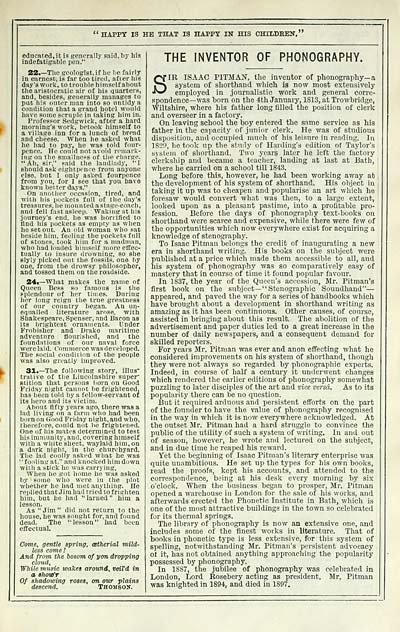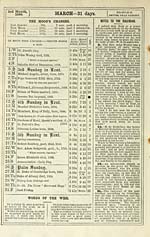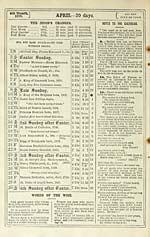Towns > Dalkeith > 1899, 1902 - Carment's directory for Dalkeith and district and year book > 1899
(139)
Download files
Complete book:
Individual page:
Thumbnail gallery: Grid view | List view

HAPPY IS HE THAT IS HAPPT IN HIS CHILDREN.'
educated, it is generally said, by his
indefatigable pen."
22.— The geologist, if he be fairly
in earnest, is far too tired, after his
day's work, to trouble himself about
the aristocratic air of his quarters,
and, besides, generally manages to
put his outer man into so untidy a
condition that a grand hotel would
have some scruple in taking him in.
Professor Sedgwick, after a hard
morning's work, betook himself to
a village inn for a lunch of bread
and cheese. When he asked what
he had to pay, he was told four-
pence. Fe could not avoid remark-
ing on the smallness of the cliarge.
"Ah, sir," said the landlady, "I
should ask eightpcnce from anyone
else, but I only asked fourpence
from you, for I see that you have
known better days."
On another occasion, tired, and
with his pockets full of the day's
treasures, he mounted astage-coach,
and fell fast asleep. Waking at his
journey's end, he was horrified to
find his pockets as empty as when
he set out. An old woman who sat
beside him, feeling the pockets full
of stones, took him for a madman,
who had loaded himself more effec-
tually to insure drowning, so she
slyly picked out the fossils, one by
one, from the drowsy philosopher,
and tossed them on the roadside.
24i— What makes the name of
Queen Bess so famous is the
splendour of her times. During
lier long reign the true greatness
of our country began. An un-
equalled literature arose, with
Shakespeare, Spenser, and Bacon as
its brightest ornaments. Under
Probisher and Drake maritime
adventure flourished, and the
foundations of our naval force
were laid. Commerce was developed.
The social condition of the people
was also greatly improved.
31.— The following story, illus"
trative of the Lincolnshire super"
Btition that persons born on Good
Friday night cannot be frightened,
has been told by a fellow-servant of
its hero and its victim.
About fifty years ago, there was a
lad living on a farm who had been
born on Good Friday night, and who,
therefore, could not be frightened.
One of his mates determined to test
his immunity, and, covering himself
with a white sheet, waylaid him, on
a dark night, in the churchyard.
Tlie lad coolly asked what he was
"fooling at," and knocked him down
with a stick he was carrying.
When he got home he was asked
by some who were in the plot
whether he had met anything. He
replied that Jim had tried to frighten
him, but he had "lamed" him a
lesson.
As " Jim " did not return to the
house, he was sought for, and found
dead. The "lesson" had been
effectual.
Come, gentle spring, cetherial mild-
less come !
And from the bosom of yon dropping
cloud,
Wliile music wakes around, veil'd in
a ahow'r
Of shadowing roses, on our plains
descend. Thomson.
THE INVENTOR OF PHONOGRAPHY.
SIR ISAAC PITMAN, the inventor of phonography— a
system of shorthand which is now most extensively
employed in journalistic work and general corre-
spondence—was horn on the 4th January, 1813, at Trowbridge,
Wiltshire, where his father long filled the position of clerk
and overseer in a factory.
On leaving school the boy entered the same service as his
father in the capacity of junior clerk. He was of studious
disposition, and occupied much of his lei.sure in reading. lu
1820, lie took up the study of Harding's edition of Taylor's
system of shorthand. Two years later he left the factory
clerkship and became a teacher, lauding at last at Bath,
where he carried on a school till 1843.
Long before this, however, he had been working away at
the development of his system of shorthand. His object in
taking it up was to cheapen and popularise an art which he
foresaw would convert what was then, to a large extent,
looked upon as a pleasant pastime, into a profitable pro-
fession. Before the days of phonography text-books on
shorthand were scarce and expensive, while there were few of
the opportunities which now everywhere exist for acquiring a
knowledge of stenography.
To Isaac Pitman belongs the credit of inaugurating a new
era in shorthand writing. His books on the subject were
published at a price which made them accessible to all, and
his system of phonography was so comparatively easy of
mastery that in course of time it found popular favour.
In 1837, the year of the Queen's accession, Mr. Pitman's
first book on the subject— " Stenographic Soundhand" —
appeared, and paved the way for a series of handbooks which
have brought about a development in shorthand writing as
amazing as it has been continuous. Other causes, of course,
assisted in bringing about this result. The abolition of the
advertisement and paper duties led to a great increase in the
number of daily newspapers, and a consequent demand for
skilled reporters.
For years Mr. Pitman was ever and anon effecting what he
considered improvements on his system of shorthand, though
they were not always so regarded by phonographic experts.
Indeed, in course of half a century it underwent changes
which rendered the earlier editions of phonography somewhat
puzzling to later disciples of the art and vice versa. As to its
popularity there can be no question.
But it required arduous and persistent efforts on the part
of the founder to have the value of phonography recognised
in the way in which it is now everywhere acknowledged. At
the outset Mr. Pitman had a hard struggle to convince the
public of the utility of such a system of writing. In and out
of season, however, he wrote and lectured on the subject,
and in due time he reaped his reward.
Yet the beginning of Isaac Pitman's literary enterprise was
quite unambitious. He set up the types for his own books,
read the proofs, kept his accounts, and attended to the
correspondence, being at his desk every morning by six
o'clock. "When the business began to prosper, Mr. Pitman
opened a warehouse in London for the sale of his works, and
afterwards erected the Phonetic Institute in Bath, which is
one of the most attractive buildings in the town so celebrated
for its thermal springs.
The library of phonography is now an extensive one, and
includes some of the finest works in literature. That of
books in phonetic type is less extensive, for this system of
spelling, notwithstanding Mr. Pitman's persistent advocacy
of it, has not obtained anything approaching the popularity
possessed by phonography.
In 1887, the jubilee of phonography was celebrated in
London, Lord Rosebery acting as president. Mr. Pitman
was knighted in 1894, and died in 1897.
educated, it is generally said, by his
indefatigable pen."
22.— The geologist, if he be fairly
in earnest, is far too tired, after his
day's work, to trouble himself about
the aristocratic air of his quarters,
and, besides, generally manages to
put his outer man into so untidy a
condition that a grand hotel would
have some scruple in taking him in.
Professor Sedgwick, after a hard
morning's work, betook himself to
a village inn for a lunch of bread
and cheese. When he asked what
he had to pay, he was told four-
pence. Fe could not avoid remark-
ing on the smallness of the cliarge.
"Ah, sir," said the landlady, "I
should ask eightpcnce from anyone
else, but I only asked fourpence
from you, for I see that you have
known better days."
On another occasion, tired, and
with his pockets full of the day's
treasures, he mounted astage-coach,
and fell fast asleep. Waking at his
journey's end, he was horrified to
find his pockets as empty as when
he set out. An old woman who sat
beside him, feeling the pockets full
of stones, took him for a madman,
who had loaded himself more effec-
tually to insure drowning, so she
slyly picked out the fossils, one by
one, from the drowsy philosopher,
and tossed them on the roadside.
24i— What makes the name of
Queen Bess so famous is the
splendour of her times. During
lier long reign the true greatness
of our country began. An un-
equalled literature arose, with
Shakespeare, Spenser, and Bacon as
its brightest ornaments. Under
Probisher and Drake maritime
adventure flourished, and the
foundations of our naval force
were laid. Commerce was developed.
The social condition of the people
was also greatly improved.
31.— The following story, illus"
trative of the Lincolnshire super"
Btition that persons born on Good
Friday night cannot be frightened,
has been told by a fellow-servant of
its hero and its victim.
About fifty years ago, there was a
lad living on a farm who had been
born on Good Friday night, and who,
therefore, could not be frightened.
One of his mates determined to test
his immunity, and, covering himself
with a white sheet, waylaid him, on
a dark night, in the churchyard.
Tlie lad coolly asked what he was
"fooling at," and knocked him down
with a stick he was carrying.
When he got home he was asked
by some who were in the plot
whether he had met anything. He
replied that Jim had tried to frighten
him, but he had "lamed" him a
lesson.
As " Jim " did not return to the
house, he was sought for, and found
dead. The "lesson" had been
effectual.
Come, gentle spring, cetherial mild-
less come !
And from the bosom of yon dropping
cloud,
Wliile music wakes around, veil'd in
a ahow'r
Of shadowing roses, on our plains
descend. Thomson.
THE INVENTOR OF PHONOGRAPHY.
SIR ISAAC PITMAN, the inventor of phonography— a
system of shorthand which is now most extensively
employed in journalistic work and general corre-
spondence—was horn on the 4th January, 1813, at Trowbridge,
Wiltshire, where his father long filled the position of clerk
and overseer in a factory.
On leaving school the boy entered the same service as his
father in the capacity of junior clerk. He was of studious
disposition, and occupied much of his lei.sure in reading. lu
1820, lie took up the study of Harding's edition of Taylor's
system of shorthand. Two years later he left the factory
clerkship and became a teacher, lauding at last at Bath,
where he carried on a school till 1843.
Long before this, however, he had been working away at
the development of his system of shorthand. His object in
taking it up was to cheapen and popularise an art which he
foresaw would convert what was then, to a large extent,
looked upon as a pleasant pastime, into a profitable pro-
fession. Before the days of phonography text-books on
shorthand were scarce and expensive, while there were few of
the opportunities which now everywhere exist for acquiring a
knowledge of stenography.
To Isaac Pitman belongs the credit of inaugurating a new
era in shorthand writing. His books on the subject were
published at a price which made them accessible to all, and
his system of phonography was so comparatively easy of
mastery that in course of time it found popular favour.
In 1837, the year of the Queen's accession, Mr. Pitman's
first book on the subject— " Stenographic Soundhand" —
appeared, and paved the way for a series of handbooks which
have brought about a development in shorthand writing as
amazing as it has been continuous. Other causes, of course,
assisted in bringing about this result. The abolition of the
advertisement and paper duties led to a great increase in the
number of daily newspapers, and a consequent demand for
skilled reporters.
For years Mr. Pitman was ever and anon effecting what he
considered improvements on his system of shorthand, though
they were not always so regarded by phonographic experts.
Indeed, in course of half a century it underwent changes
which rendered the earlier editions of phonography somewhat
puzzling to later disciples of the art and vice versa. As to its
popularity there can be no question.
But it required arduous and persistent efforts on the part
of the founder to have the value of phonography recognised
in the way in which it is now everywhere acknowledged. At
the outset Mr. Pitman had a hard struggle to convince the
public of the utility of such a system of writing. In and out
of season, however, he wrote and lectured on the subject,
and in due time he reaped his reward.
Yet the beginning of Isaac Pitman's literary enterprise was
quite unambitious. He set up the types for his own books,
read the proofs, kept his accounts, and attended to the
correspondence, being at his desk every morning by six
o'clock. "When the business began to prosper, Mr. Pitman
opened a warehouse in London for the sale of his works, and
afterwards erected the Phonetic Institute in Bath, which is
one of the most attractive buildings in the town so celebrated
for its thermal springs.
The library of phonography is now an extensive one, and
includes some of the finest works in literature. That of
books in phonetic type is less extensive, for this system of
spelling, notwithstanding Mr. Pitman's persistent advocacy
of it, has not obtained anything approaching the popularity
possessed by phonography.
In 1887, the jubilee of phonography was celebrated in
London, Lord Rosebery acting as president. Mr. Pitman
was knighted in 1894, and died in 1897.
Set display mode to: Large image | Transcription
Images and transcriptions on this page, including medium image downloads, may be used under the Creative Commons Attribution 4.0 International Licence unless otherwise stated. ![]()
| Scottish Post Office Directories > Towns > Dalkeith > Carment's directory for Dalkeith and district and year book > 1899 > (139) |
|---|
| Permanent URL | https://digital.nls.uk/86551304 |
|---|
| Description | Annual. Published 1899-1902. Preceded by: Carment's ... directory for Dalkeith and district. |
|---|---|
| Shelfmark | 5.1429 |
| Additional NLS resources: |
| Description | Directories of individual Scottish towns and their suburbs. |
|---|
| Description | Around 700 Scottish directories published annually by the Post Office or private publishers between 1773 and 1911. Most of Scotland covered, with a focus on Edinburgh, Glasgow, Dundee and Aberdeen. Most volumes include a general directory (A-Z by surname), street directory (A-Z by street) and trade directory (A-Z by trade). |
|---|


